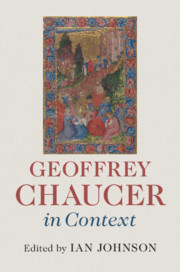Book contents
- Geoffrey Chaucer in Context
- Geoffrey Chaucer in Context
- Copyright page
- Contents
- Illustrations
- Contributors
- Abbreviations
- Introduction
- Part I Chaucer as Context
- Part II Books, Discourse and Traditions
- Part III Humans, the World and Beyond
- Part IV Culture, Learning and Disciplines
- Part V Political and Social Contexts
- Part VI Chaucer Traditions
- Chapter 48 The First Chaucerians
- Chapter 49 The Reception of Chaucer in the Renaissance
- Chapter 50 The Reception of Chaucer from Dryden to Wordsworth
- Chapter 51 The Reception of Chaucer from the Victorians to the Twenty-First Century
- Chapter 52 Cyber-Chaucer
- Further Reading
- Index
Chapter 48 - The First Chaucerians
Reception in the 1400s
from Part VI - Chaucer Traditions
Published online by Cambridge University Press: 24 June 2019
- Geoffrey Chaucer in Context
- Geoffrey Chaucer in Context
- Copyright page
- Contents
- Illustrations
- Contributors
- Abbreviations
- Introduction
- Part I Chaucer as Context
- Part II Books, Discourse and Traditions
- Part III Humans, the World and Beyond
- Part IV Culture, Learning and Disciplines
- Part V Political and Social Contexts
- Part VI Chaucer Traditions
- Chapter 48 The First Chaucerians
- Chapter 49 The Reception of Chaucer in the Renaissance
- Chapter 50 The Reception of Chaucer from Dryden to Wordsworth
- Chapter 51 The Reception of Chaucer from the Victorians to the Twenty-First Century
- Chapter 52 Cyber-Chaucer
- Further Reading
- Index
Summary
However well-regarded Chaucer’s works were during his lifetime, it was his immediate successors who fashioned him into the ‘father of English poetry’ they then bequeathed to the subsequent English literary tradition. In particular, the poets Thomas Hoccleve and John Lydgate not only represented Chaucer in this manner in their own, widely disseminated works, they were also instrumental in the broad dissemination of Chaucer’s works. Importantly, these activities were motivated not just by admiration but also by a politico-literary context in which Hoccleve and Lydgate, unlike Chaucer, were asked to produce works that spoke both for a prince and to a prince. Their invention of Chaucer’s literary authority cannot then be separated from their intervention into politics, and this conflation they also bequeathed to the English literary tradition, where it remained plainly visible in the works of their own successors, and where it persists, more obscurely, to the present.
Keywords
- Type
- Chapter
- Information
- Geoffrey Chaucer in Context , pp. 403 - 409Publisher: Cambridge University PressPrint publication year: 2019

